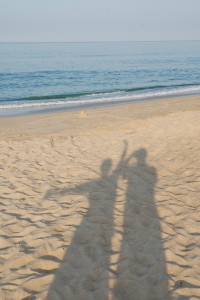Sustainability Across the U.S.
/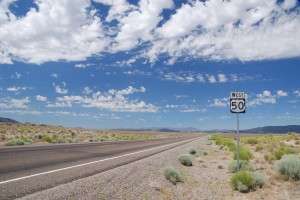 This time last year I was just starting a week-long intensive MBA course on Global Sustainability.
This time last year I was just starting a week-long intensive MBA course on Global Sustainability.
The class – which covered everything from green technology innovation to social entrepreneurship – really focused on three distinct environmental challenges: Food, Water and Energy.
If there was one major takeaway from that week of class, it's that these three issues are inextricably linked. You can’t solve our water scarcity issues, for instance, without taking a hard look at American meat consumption.
When it comes down to it, food, water and energy are the building blocks of sustainability.
A year later, the ideas and questions from that class popped into my head – this time on our two week drive cross country from Boston to San Francisco. Over the course of 16 days, my husband Dan and I traveled through 19 states, making stops in the following cities:
- Berkeley Heights, NJ
- Nags Head, NC
- Charleston, SC
- Savannah, GA
- New Orleans, LA
- Abilene, TX
- Alamogordo, NM
- Santa Fe, NM
- Moab, UT
- Bryce Canyon, UT
- Ely, NV
- Lake Tahoe, CA
- San Francisco Bay Area, CA.
Needless to say, we saw a lot of America in just over two weeks!
Our goal for the trip was to say off the Interstate wherever we could; thankfully, outside of an incredibly long drive across I-20 in Texas, we managed to stick to smaller, two-lane roads for most of the trip.
Choosing this “off the beaten path” route served a couple of purposes. First (and perhaps selfishly), the drive seemed a lot more pleasant when we weren’t staring at concrete overpasses or stuck in commuter traffic. But secondly, and more importantly, getting off the main roads helped us get a better sense of what the United States actually looks like.
While we might have ended each day's drive in a bigger city or town, we spent most of our days exploring roadside villages and small towns intersected by a tiny highway. And while it's perhaps cliche to say how big our country really is - I have to admit, the U.S. really is huge!
Beyond size, though, spending two weeks on the road is a sure way to better understand just how economically, politically, and culturally diverse the U.S. really is.
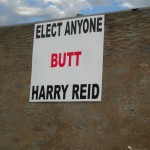
The people, the food, the social issues – each small town and each big city clearly had its own priorities and culture, which made our trip incredibly eye-opening.
(Honestly, it’s no wonder people have trouble finding common ground on big picture issues like government, politics, and immigration – our country is simply filled with too many people who believe in too many different things!)
Yet at the same time, since our trip ended it’s actually been pretty easy to look back and identify some commonalities among all of those differences.
While I can’t back up any of the following assertions with hard facts, census data, or research studies, I can say that, in my heart of hearts, I believe there are some very clear and very common issues that our country is facing.
Once again, it all comes down to Food, Water and Energy.
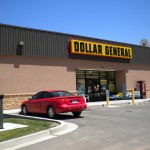
Access to Fresh Food: A while back I saw a PBS news segment on Food Deserts – that is, locations throughout the U.S. where 50% or more of the population has low access to supermarkets. After driving through some of the most rural and economically depressed areas in the country, I can now say I’ve seen these Food Deserts with my own eyes.
For those of you with Whole Foods and Trader Joe’s on practically every corner, you might be surprised (as I was) to visit places with absolutely no grocery stores in sight. Yet this was the reality we observed in many of the towns we visited on our trip.
We went in expecting “Main Street USA” to be filled with Mom and Pop retail stores, pharmacies and restaurants – a local flavor, if you will. Instead, what we found were Hardees, McDonalds, Sonic Burger, and Dollar General stores (not to mention the Pay Day Lending agents offering outrageous interest rates, but that’s for another post).
This got us thinking: We managed to do ok on the road with our cooler in the backseat filled with bread and cold cuts (sourced from the occasional Walmart when we were lucky to find one). But we were just “passing through”. What about the people who actually live – and try to feed their families – in these small communities? Where do they get fresh food? What are their options beyond fast food, or even dollar stores selling pre-packaged dinners?
Needless to say, the potential answers to these questions were very troubling.
Water: While water-scarcity was a common theme (especially in the hotels we visited in New Mexico and the Utah desert), what worried me the most was actually access to clean, filtered water.
As road trippers with reusable water bottles, we were always on the lookout for places to fill up our water supplies – which means we got to sample quite a bit of local water.
As we made our way through the country, and especially through Texas and into New Mexico, we started noticing an odd taste in our drinking water. Soon, what started out as a bit “earthy” actually became so dirty and foul-tasting that we opted to buy a couple of bottles.
Now I can’t say for sure that this water wasn’t drinkable, but it certainly made me pause, especially after having made it through our own recent boil water order in Boston.
Water is something we often don’t pay attention to – until we can’t find any.
As someone used to being able to chug freely from the tap, I was reminded on this trip just how precious – and tenuous – our relationship with clean water in this country really is.
Energy: Energy was also top of mind for me, especially as we drove through Texas and saw countless wind farms (exciting) and oil wells (ick) dotting the landscape. Not to mention having to fill up our gas tank every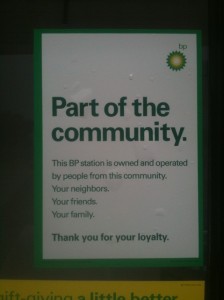 day. Nothing like a cross country drive to remind you how reliant we all are on oil!
day. Nothing like a cross country drive to remind you how reliant we all are on oil!
Speaking of oil, there was simply no way to drive through the Gulf Coast and not think about the recent BP Oil Spill. While I think I will save my complete thoughts on the oil spill for a later post, I will say that being “on the ground” in the South reminded me of how complicated this issue is for people.
Yes, BP seriously screwed up – and as an environmentalist the whole situation makes me beyond angry.
But the side of the story that people don’t often consider is that oil is not just a big business – it’s a big employer for American workers, and a big supporter of local economies.
As our host in New Orleans explained to us, if BP pulls out of the Gulf, “what will happen to all of local restaurants and businesses – and their employees – that exist simply to support BP?”
A tough question, indeed.
While Food, Water and Energy were big questions for me throughout our trip, I can't even begin to describe how beautiful our country is - and how welcoming, resilient and friendly people are.
We may not agree on everything - and we may approach sustainability in different ways - but we are one amazing country.
If you haven't yet driven cross country - what are you waiting for?!
